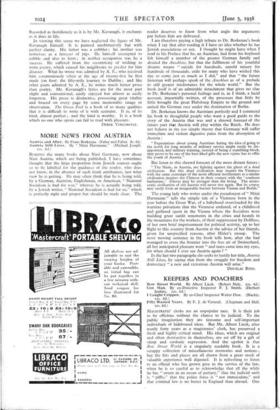MORE NEWS FROM AUSTRIA
READING the many books about Nazi Germany, now about Nazi Austria, which are being published, I have sometimes
thought that the large proportion from Jewish sources ought so to be labelled for the guidance of the reader, who does not know, in the absence of such frank attribution, just what view he is getting. He may often think that he is being told, by a German, Austrian, Englishman, or American, " National Socialism is bad for you," whereas he is actually being told, by a Jewish writer, " National Socialism is bad for us," which is perfectly right and proper but should be made clear. The reader deserves to know from what angle the arguments put before him are delivered.
I am therefore paying a high tribute to Dr. Borkenau's book when I say that after reading it I have no idea whether he has Jewish associations or not. I thought he might have when I read in his Preface that he, an Austrian, had from his boyhood felt himself a member of the greater German family and desired the Anschluss, but that the fulfilment of his youthful dreams means " suicide for hundreds, untold misery for hundreds of thousands, exile for many who have wished this day to come just as much as I did," and that " the future historian will perhaps speak of the Anschluss as of a prelude to still greater misfortunes for the whole world." But the book itself is of an admirable detachment that gives no clue to Dr. Borkenau's personal feelings and is, as I think, a lucid account, impartially written, of the processes that little by
little brought the great Habsburg Empire to the ground and united the German race under the domination of Berlin.
Dr. Borkenau knows the Austrians perfectly and I commend his book to thoughtful people who want a good guide to the story of the Austria that was and a shrewd forecast of the future part that Austria will play within the Reich. He does not believe in the too simple theory that Germany will suffer immediate and violent digestive pains from the absorption of Austria :
" Expectations about young Austrians hating the idea of going to the north for long months of military service might easily be dis- appointed, and military training, instead of being a stumbling-block, may prove to be one of the best-liked gifts the new regime has to offer the youth of Austria."
But listen to this shrewd forecast of the more distant future :
" The Nazis, in Austria, are fighting against the ghost of a dead civilisation. But this dead civilisation may inspire the Viennese with the same contempt of the more efficient northerners as a similar civilisation inspires the Chinese in their contact with the ' southern barbarians.' Ghosts may be stronger than the living. The aristo- cratic civilisation of old Austria will never rise again. But its corpse may easily form an insuperable barrier between Vienna and Berlin."
The young lady who writes under the pseudonym of " Mitzi
Hartmann " tells the simple tale of a Viennese born in the year before the Great War, of a babyhood overclouded by the wartime privations that the Viennese endured, of a childhood and girlhood spent in the Vienna where the Socialists were building great sunlit tenements in the cities and hostels in the mountains for the workers, of their suppression by Dollfuss, of her own brief imprisonment for political activity, up to her flight to this country from Austria at the advice of her friends, given for unspecified reasons, after Hitler's swoop. The most moving sentence in the book tells how, after she had managed to cross the frontier into the free air of Switzerland, all her anticipated pleasure went " and tears came into my eyes, for when should I ever see Austria again ? "
In the last two paragraphs she seeks to justify her title, Austria Still Lives, by saying that from the struggle for freedom and democracy " a new and victorious Austria will arise."
DOUGLAS REED.


















































 Previous page
Previous page